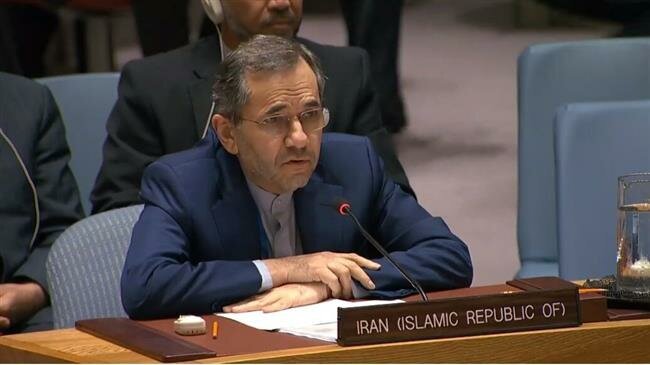Iran’s Takht-Ravanchi warns of Washington’s ‘divide and rule’ strategy

TEHRAN – Majid Takht-Ravanchi, Iran’s ambassador to the United Nations, warned on Tuesday that the U.S. is seeking to sow discord among regional states through its “divide and rule” strategy.
“The sole beneficiary of weapons stockpiling in the region is the defense industry of the exporting countries. We should not ignore the U.S. ‘divide and rule’ mechanism, which seeks to sow seeds of permanent discord among regional states,” Takht-Ravanchi told the UN Security Council meeting on Middle East peace and security challenges, Press TV reported.
The Iranophobic remarks by American officials are meant to accomplish such an objective, Takht-Ravanchi said, adding, “They have leveled unfounded accusations against Iran in order to justify their regional policies, and prevent the country from performing its role in the region.”
“While we are not seeking confrontation, we cannot and will not remain indifferent to the violation of our sovereignty. Therefore, in order to secure our borders and interests, we will vigorously exercise our inherent right to self-defense,” Takht- Ravanchi told the Security Council.
He also pointed to the U.S. attempt to lead a coalition in the Persian Gulf, saying foreign forces are causing insecurity and instability in the Strait of Hormuz with their military presence in the strategic sea passage.
He emphasized that the responsibility of ensuring the water body’s security rests only with Persian Gulf littoral states.
Takht-Ravanchi further described the deployment of more than 70,000 U.S. servicemen as one of the main reasons behind the instability in the Middle East, stressing that the Pentagon has active military presence in all Persian Gulf states except for Iran.
He said the number of foreign military installations in the Middle East has jumped from four in 1991 to 41 in 2018, with nearly all of them belong to the U.S.
This marks “the highest concentration of military sites in the world,” he remarked.
Takht-e Ravanchi then highlighted that Tehran will continue to ensure the security of maritime navigation in the Middle East, particularly in the Strait of Hormuz, adding that the United States’ attempts to set up a military coalition in the Persian Gulf to counter what it calls the “Iran threat” will fail.
U.S. Marine General Joseph Dunford, chairman of the Joint Chiefs of Staff, said on July 9 that the U.S. was proceeding with plans to assemble the coalition purportedly aimed at ensuring freedom of navigation in waters off Iran and Yemen.
Meanwhile, Washington’s call to form the coalition has been faced with reluctance even on the part of its close allies. So far, only a few countries, including Bahrain, Britain and Australia have agreed to join the coalition.
MH/PA
